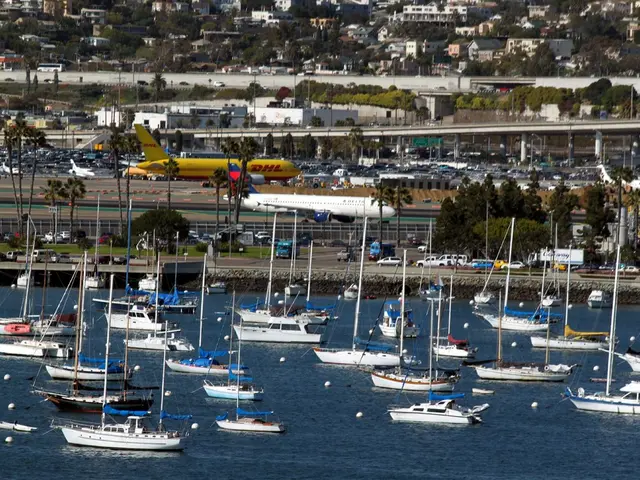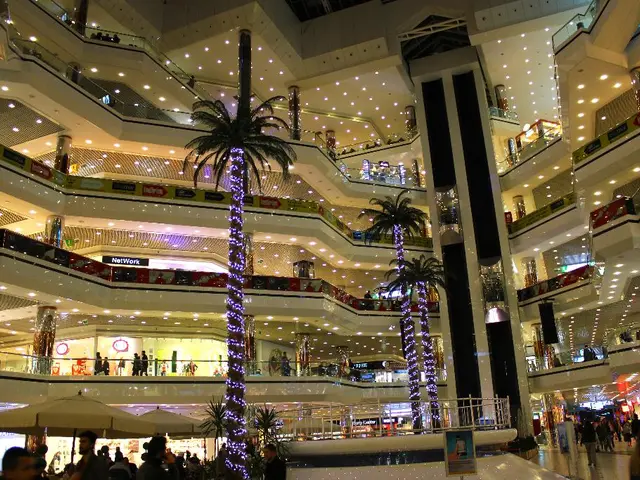Spilling the Tea: Merkel's Green Light for Gazprom Deal and the Energy Crisis Horror Show
Merkel's Indirect Agreement with Gazprom Deal Unveiled
The German government's coziness with Russia, under Merkel's reign, has been nothing short of a catastrophe, at least since Putin's aggressive move on Ukraine. Now, files that were under lock and key are seeing the light of day, revealing the shady backstory of the gas storage sale to Gazprom. The Süddeutsche Zeitung managed to secure the release of these damning documents under the Freedom of Information Act.
The inner workings of Merkel's administration reveal that she took a hands-off approach to the sale of German gas storage to the Russian state-owned behemoth, Gazprom. Despite internal warnings and Russia's annexation of Crimea, Merkel played along, giving Gazprom the chance to plunge Germany into a deep energy crisis.
In autumn and winter of 2021/2022, gas storage levels in Germany plummeted, and supplies from Mother Russia were nowhere to be found. The outcome? A massive energy crisis.
Fast-forward to 2015, Merkel was officially informed in writing that a sneaky asset swap was in the cards as part of BASF/Wintershall's involvement in the Nord Stream 2 gas pipeline project. The deal would see Gazprom snatching a piece of Germany's gas trade, while Wintershall, a BASF subsidiary, would grab a share of gas fields in West Siberia. The SPD Economics Minister Sigmar Gabriel assured the CDU politician that there were "no energy policy concerns" about the swap.
The Chancellery, in its wise and legally justifiable wisdom, deemed the deal a-okay, despite the risks: Gazprom becoming the primary gas supplier for German city utilities, regional gas providers, companies, and power plants. "With control of pivotal gas storage (filling and functionality), Gazprom will have a firm grip on its clients' supply security," the internal documents read.
The Chancellery also cooked up a slew of arguing points to quell anticipated backlash from Poland, Ukraine, and the Baltic states. Their primary concern? The annexation of Crimea and Russia's shady dealings in Eastern Ukraine. Merkel's suggested solution? To "openly and transparently communicate the nitty-gritty (lack of legal basis, business decision) to these partners."
When the Süddeutsche Zeitung requested the release of these incriminating documents in 2024, the Chancellery dilly-dallied, initially refusing. But after the SZ filed a complaint, they suddenly had a change of heart and complied.
The state-owned Nord Stream 2 operator was allowed to scout for investors in a Swiss court ruling. The documents reveal that the German government was secretly rooting for the Nord Stream 2 pipeline project, while posing as Switzerland during public appearances.
Despite the looming threat of dependence on Russian gas, Merkel's government was all heart for the pipeline project. The documents state, "The current push by Gazprom for a 3rd/4th Nord Stream line is to be welcomed from a DEU and European perspective."
The risks of increased dependence on Russian gas were downplayed. But when it mattered most, Germany couldn't afford to stand against Nord Stream 2. The thinking? Nord Stream 2, complete with pipes 3 and 4, would help buck up a weakening gas business.
The risks to Ukraine's financial well-being from losing gas transit revenue and receiving less gas were also minimized. The documents propose that additional quantities passing through Germany could be rerouted to Ukraine via "reverse flow," ensuring they wouldn't be left high and dry.
The sale of German gas storage to Gazprom significantly exacerbated Germany's energy crisis, giving Russia undue political leverage. The lesson? You can't dance with the devil and expect to come out unscathed.
Sources: ntv.de, mau
- Gazprom
- Angela Merkel
- Crimea
- Attack on Ukraine Developments:
- The sale of gas storage facilities to Gazprom increased Germany's dependence on Russian gas, leading to a crisis when Russia used energy as a political weapon.
- Germany's energy policy under Merkel was criticized for underestimating the risks of dependence on Russian gas and downplaying the threats to Ukraine.
- The Nord Stream 2 pipeline project, which Merkel supported, was seen as a strategic blunder and a symbol of Germany's past naivety in Russia relations.
- The exposed German government documents reveal that Chancellor Angela Merkel, despite internal warnings and Russia's annexation of Crimea, greenlit the sale of German gas storage facilities to Gazprom, heightening Germany's dependency on Russian energy and potentially leading to a future energy crisis.
- The German government's employment of Gazprom as a primary gas supplier for city utilities, regional gas providers, companies, and power plants, as revealed in the documents, portrays an energy policy that undermines industries reliant on a stable energy supply and threatens Germany's overall economic stability.
- The German government, as indicated by the documents, took a politically questionable approach in the energy sector by supporting the Nord Stream 2 pipeline project despite Russia's aggressive move against Ukraine, jeopardizing political stability in the industry and raising concerns about Germany's foreign policy decisions.








